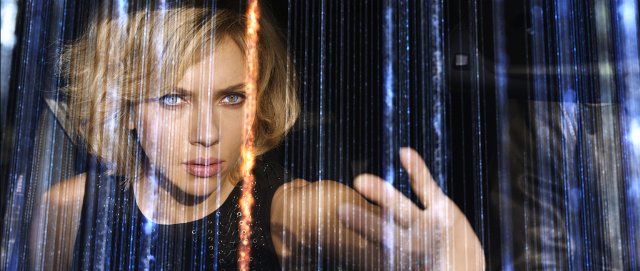10 percent story (Lucy)
Oh, where to begin with this? Lucy had lots of potential, but shied away from the follow through.
First, Luc Besson is one of my favorite screenwriters. I’m not saying the man can do no wrong. I’m saying he’s written several of my favorite movies (Le Femme Nikita, Leon: The Professional, The Fifth Element, Wasabi). So, while I was prepared to dismiss this film, I made a point of seeing it because he wrote and directed it.
I almost dismissed it because of the idiotic line in the trailer, which is not actually in the film. “Lucy is the first person to be able to use more than 10% of her brain.” The 10% of the brain crap is a cool sci-fi device, but it has absolutely no basis in fact. The first way I heard this ridiculous statement was someone speaking about why humans actually all have psychic powers that we’re somehow incapable of using. And even then the statement was, “humans use ten percent of their brains’ potential.” Apparently that one didn’t even rise to the level of being mentioned on Wikipedia. In Lucy, they bend the line to “Cerebral Capacitance.” It’s still crap, but it is just an excuse to give Scarlett Johansson super powers.
I could geek out on some of the science that is kind of in the film, and I could bore the shit out of you with it. Fortunately, the film glosses over it quickly. Unfortunately, that removes a lot of the plausibility. The drug that imparts the title character with her abilities does a whole lot more than make more sparks in her brain. Moving on. 
Lucy reminded me a lot of Josephine. That is when Josephine was full-on, true believer, she had the same sort of emotionless determination. Lucy actually ceases being human altogether, and she does some pretty f#@$ing horrible things as a result. At the same time, she’s pretty cool. She bends into 2001: A Space Odyssey territory, including delivering a small version of The Monolith with a USB port attached. “My god, it’s full of stars.”
With the willingness to go there, I was disappointed in the film. It had tremendous potential for more profound statements, that just weren’t delivered. There was a really good device of cutting to film from nature programs in the first few scenes that did an excellent job of showing Lucy’s thought process. This was abandoned without rationale in Act I Scene 3. It could have been used to deliver the whole message of the film. As she moves from unwilling drug mule to goddess of relativity and cellular interaction, the cutaways could have moved from her imagining watching animals to her interacting with them, to her guiding/helping them, intersecting at the last moment when she does Michelangelo’s Birth of Adam with Australopithecus.
That was the way of it, a blend of fantastic ideas from all sorts of sources that almost, but just don’t quite gel together into the film it should have been.